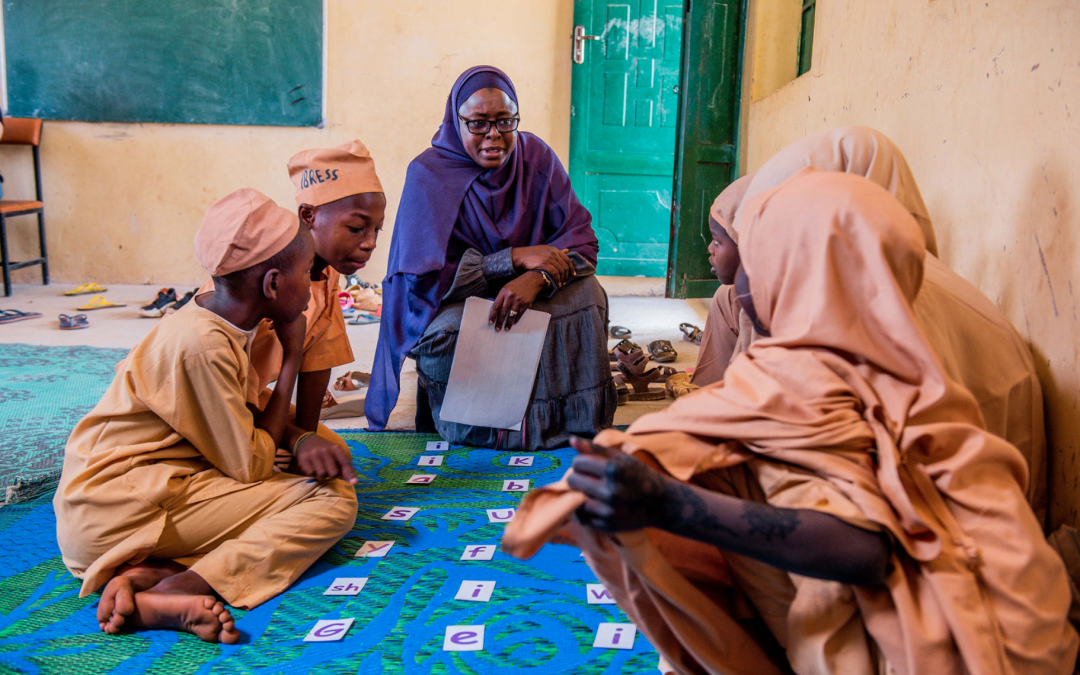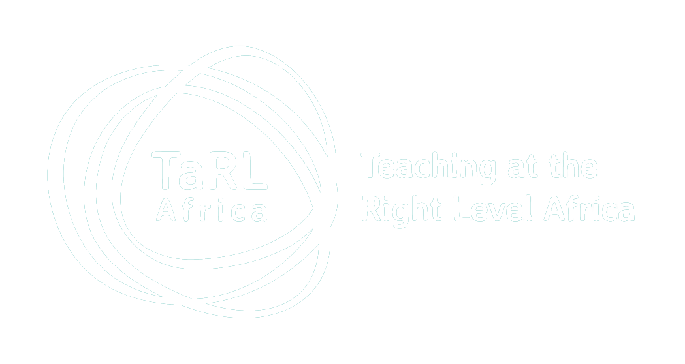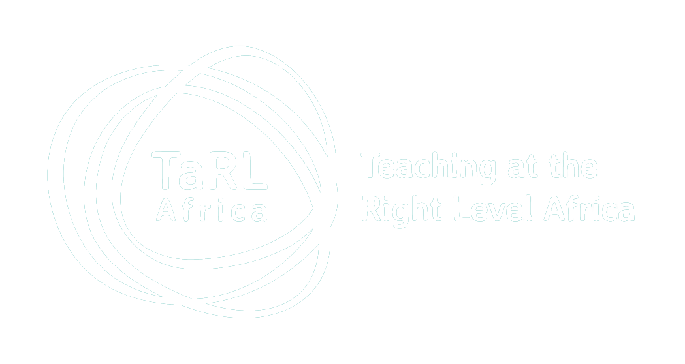
A teacher facilitating a TaRL literacy activity in Nigeria. (Photo: British Council)
“My donkey’s name is Bare.”
This seems like a simple sentence. However, according to statistics from the ‘Learning Crisis in the Nigerian Literacy of 2021‘ 70 percent of 10-year-olds in Nigeria can neither read nor comprehend a simple sentence like this one. These children are going through a learning crisis. Furthermore, multiple challenges including the lack of data in developing countries on who is learning and who is not have made it difficult to target interventions that can help solve the crisis of learning. The COVID-19 pandemic has also exacerbated the issue, necessitating crucial and decisive steps to improve the situation.
The World Development Report 2018 recommends the best way to equip children and youth for the future is to place their learning at the centre. The report explores four main themes, one being how to make systems work for learning. It is to this end that TaRL Africa has been making conscious efforts at integrating the evidence-based Teaching at the Right Level (TaRL) approach into government systems in Nigeria. TaRL is an accelerated learning approach, which groups learners based on their current learning levels rather by age or grade after a one-on-one assessment. Subsequently, learners’ foundational skills are built through fun and engaging activities.
TaRL programs have been delivered as government-led interventions in multiple contexts. This began with a six-month pilot in September 2018, when the Borno State Basic Education Board (SUBEB) and the State Ministry of Education, with support from UNICEF, Plan International, TaRL Africa and FCDO launched the TaRL methodology in 12 schools in Borno State. The methodology has expanded and TaRL Africa currently supports state governments and partners in seven states – Adamawa, Bauchi, Borno, Kaduna, Kano, Kebbi and Yobe states to implement TaRL programmes. Given the diversity of Nigeria as a country and state-level differences, the programmes are contextualized to meet state-specific needs and characteristics. In Kano, for example, both during the pilot phase and the current implementation phase, the methodology is implemented in all public schools in selected Local Government Areas. In some other instances, like in Kebbi, where the program is being implemented with the Universal Basic Education Commission (UBEC) Teacher Professional Development fund, the number of schools covered is determined by the approved fund by the umbrella regulating body for basic education in the country, UBEC.
Building TaRL elements into existing government structures
TaRL Africa realizes the importance of working with government and through government systems to reach sustainable scale. This is why TaRL Africa supports governments in contextualizing the approach to suit their local realities. A suitable programme design is co-created to foster ownership of the programme in the government system. In addition, government personnel’s capacity on the TaRL approach is built through training, re-training and mentoring support to ensure sustainability of the intervention.
Program management and decision making
In the Nigerian context, TaRL Africa takes another important step to embed the methodology into the government system — constituting State Steering Committees (STEERCO) and the Technical Working Groups (TWGs) or Programme Implementation Teams (PIT). The STEERCOs are headed by senior officials from the ministries of education (MoE) either the Honourable Commissioner of Education or the Permanent Secretary while the TWGs/PITs are headed by key directors from SUBEBs, MoE, colleges of education, and School Based Management Committees (SBMCs). While STEERCO provides overall oversight, the TWG/PITs, with the support from TaRL Africa, are responsible for the effective implementation of the programme.
Teacher training
As the producers of pre-service teachers, colleges of education play a significant role in building capacity of the TaRL approach in the system in a sustainable manner. During the pilot phase of the Kano Literacy and Mathematics Accelerator (KaLMA) programme between 2019 and 2021, where the methodology was implemented by the Kano government with support from British Council, TaRL Africa and the Foreign Commonwealth Development Office (FCDO) we worked closely with Sa’adatu Rimi College of Education, Kumbotso. A collection of the college tutors were trained as Master Trainers and some student teachers were trained and deployed to primary schools to conduct TaRL classes as part of their compulsory teaching practice. The student teachers assisted schools to not only implement the programme effectively but also reduce pupil-teacher-ratio and class sizes. Building the capacity of the tutors was to deepen their understanding of the TaRL methodology as the partnership explores opportunities to embed the methodology within the college’s minimum standard for teacher pre-service education. During the pilot phase of KaLMA program between 2020 and 2021, efforts were made to embed the TaRL methodology into the curriculum of the colleges of education. Part of the efforts was the training of student teachers from Sa’adatu Rimi college of Education, Kumbotso. Upon scaling up the methodology into five additional Local Government Areas (LGAs), Aminu Kano College of Islamic and Legal Studies was added to support teacher training efforts. Apart from getting most of the Master Trainers from the two colleges of education, TaRL Africa is working closely with the colleges’ management to better integrate into the colleges’ training programmes.
Material review and development
To contextualize teaching and learning content and materials, experts from relevant government agencies (federal and state-level) work together to review existing TaRL materials and develop contextually-relevant content. TaRL Africa collaborates closely with UBEC and SUBEBs, the bodies responsible for basic education at national and state level; Teachers Registration Council (TRCN), responsible for teacher certification and professional regulation; Nigeria Education Research and Development Council (NERDC), responsible for material development and standardization; and the National Commission for Colleges of Education (NCCE). They are involved through material review workshops, learning journeys, and dissemination programmes as well as joint review missions. This collaborative process builds an understanding of the TaRL methodology and enables buy-in which is critical to recognizing and embedding the methodology into the systems at the national and state levels. Additionally, in Kano, the State Education Resource Development Department (KERD) is also involved in the content and materials review and development process to ensure that materials are contextualised to meet the needs of the Kano environments – religious and cultural.
Leveraging personnel in the system to deliver TaRL programmes
Other efforts at embedding the TaRL methodology into the government system is the engagement of government personnel in programme implementation. In TaRL programmes, in addition to the teachers who conduct TaRL sessions, trainers and mentors also play an important role. In the Nigerian context, the master trainers are responsible for training and providing mentorship support to mentors and teachers. These individuals are government staff from colleges of education, SUBEBs, Local Government Education Authorities (LGEAs), and ministries of education. Even the teachers, who facilitate the classroom activities, are government staff. The capacity of these government officials is built through training and retraining as well as providing them with mentoring and monitoring support.
In TaRL programmes in Nigeria, TaRL Africa has attempted to leverage existing government structures to collect, analyse and disseminate programme data. For instance, the assessments conducted at different times during programme implementation, which are a critical part of the methodology, are teacher-led. Assessment data collation and entry are also done by headteachers, School Support Officers (SSOs) and Educational Management Information System (EMIS) Officers; with EMIS Officers involved at the LGEA level review meetings where assessment results are shared with the stakeholders in the local government areas.
Moreover, TaRL Africa works closely with communities, traditional and religious leaders to sensitize them to the TaRL approach. In all the places where TaRL Africa works in Nigeria, we continue to enjoy deep cooperation and collaboration from these groups. We have instances where School-Based Management Committees (SBMCs) have recruited and paid teachers to teach the methodology in their schools. Some of the people who have Nigerian Certificate of Education (NCE) qualification also volunteer to teach in some schools. In some cases, they employ the services of town-criers to sensitize parents to send their children and wards to school on market days and during rainy seasons when they usually take the children to their farms.
Improvements in government buy-in and learning outcomes
No doubt, TaRL Africa is not working in silos in Nigeria. The organisation works to strengthen the existing systems and people to ensure the TaRL methodology is planted firmly in Nigeria. As the TaRL methodology grows in the country, state governments are recognising its impact on learning outcomes, personnel, and systems and committing funds to pilots and the scale-up phase. The Kebbi government funded its TaRL pilot by embedding it into its Teacher Professional Development (TPD) plan which was approved by UBEC while the programme extension in 2022 has been directly funded through the state governor’s approved funds allocation. In Kano, the government committed funds from its Better Education Service Delivery for All (BESDA) budget to scale-up the programme to two additional LGAs alongside the FCDO-PLANE programme support for another three new LGAs.
Kano State Government’s choice to spread the TaRL methodology into other LGAs on their own using the BESDA budget is a noteworthy example of growing government ownership of the intervention. The state government is committed to spending NGN 143,600,000 million on the methodology in Ungogo and Warawa LGAs. In addition, the inculcation of the TaRL methodology into the government’s Medium Term Sector Strategy (MTSS) and budget shows government’s commitment to embedding the TaRL methodology into the education system. This did not only happen in Kano but also in Kebbi where the state government built the methodology into the plan they submitted to UBEC. The plan was not only approved by UBEC but is being implemented in the state for two years now.
Indeed, the TaRL methodology has contributed to raising the learning outcomes of pupils in Nigeria. During the pilot in Kano, 60% of the pupils tested in Hausa literacy were at the Beginner level, while only eight percent were at the paragraph and story levels at baseline. However, at the endline, the percentage of pupils at the Beginners level reduced to 17% (from 60%), while those who could read paragraphs increased to 25% (from eight percent). In the words of Alhaji Tijjani Haladu Baraya, the State Chairman of the School-Based Management Committee, “We have never had it this good”. The TaRL methodology is so readily embraced in the new 5 LGAs that it has been scaled-up, due to the success stories from the two pilot LGAs of Dawakin Tofa and Wudil.
“Unlike before the intervention, teachers now engage the children in learning and the children are demonstrating evidence of their learning for parents to see at home,” said Alhaji Tijjani.
According to Malam Shehu Musa, a parent in Wudil LGA, and a former headteacher, the impact of the methodology on his children is evident.
“My child in the upper primary school, who is in the TaRL programme, has been supporting his older siblings in secondary with their academic work at home, using TaRL activities,” said Mr Musa.
Fatima Adhama Dahiru is a volunteer teacher in Bauchiyal Primary School Wudil, who was trained on the TaRL approach. According to her, she has seen impeccable improvement in learners in her literacy class.
“At the inception of the TaRL programme, some learners would struggle with writing their name, now they are at story level and can read well,” confirmed Ms Fatima.
Conclusion
The TaRL approach is a trailblazer in improving the gaps that exist in children’s foundational skills in literacy and numeracy before the transition to junior secondary school. This is the task that TaRL Africa has committed to in the seven states where the organization supports state governments and partners to deliver TaRL programming. This, it has been doing with admirable results evident in raising children’s learning outcomes and in moving them out of illiteracy to being able to read and write.

